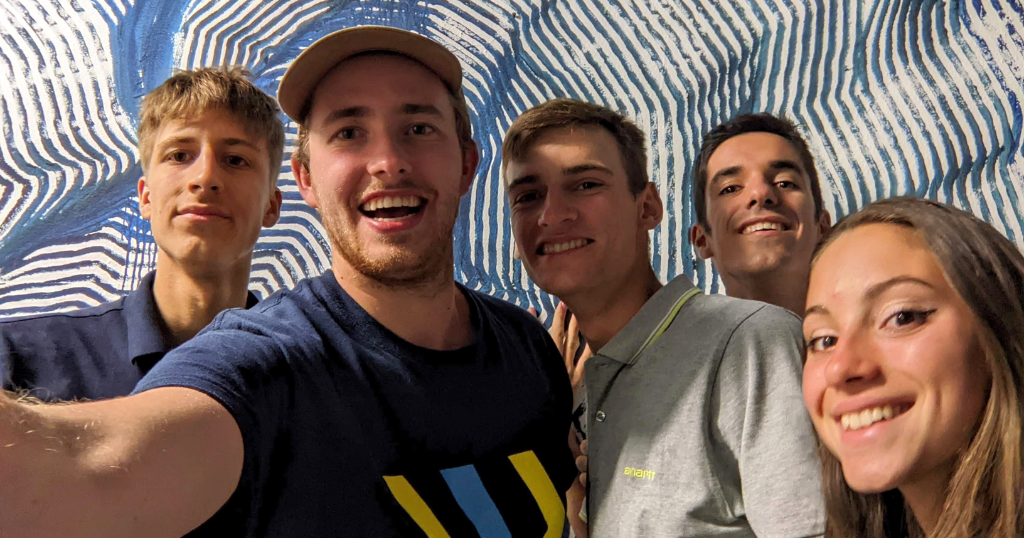Key numbers of my volunteering season:
- Number of projects led: 3
- Number of days leading: 29
- Number of volunteers met: 27
- Number of different volunteer’s countries: 12
- Number of Local Partners met: 6
My workcamps:
The three projects I took part in were all different from one another and I managed to learn something new and different from each one of them.
The basis of people managing
My first workcamp took place on an old baroque farm in early July and lasted one week. This was my first time being a campleader and more generally my first time being in charge of a group of people.
I can say with certainty that this was my most challenging project but also the one where I learned the most.
To give you some context:
The project was located in a small village called Vysoká one hour north of Prague and took place in local cultural centre Farmstudio. I decided to lead this workcamp because the duration of the project (8 days) was ideal, and the number of volunteers was not too high.
For me, it was the perfect opportunity to put my newly acquired campleading’s skills to the test.
On my way to the project location, I still remember the mindset I had. “How hard can it be to manage a group?” “After all, we already met the volunteers online and they were really kind.” “Everything went smoothly during the preparatory visit, why should it be different now?”.
To sum up I thought this project was going to be a piece of cake. It turned out that I was wrong. I underestimated the role’s difficulty.
To illustrate how confident I was, I was convinced that having a board with the rules or a plan for the hours dedicated to work and free time was useless. After all, volunteers are good people by definition, so they do not need any rules.
Even though everything was running flawlessly for the first few days, I quickly realised that rules are a must-have if you want to manage any kind of group.
In fact, after a couple of days, it was harder and harder to find people agreeing to set up the table, clean the dishes, mop the floor, prepare breakfast and do other daily chores that needed to be done.
I had to face it, the system was obviously not working. So to cope with this, I decided to do chores by myself. For me, it was the logical thing to do as I could be sure that everything required would be done.
Ultimately I realised that wanting to do as many tasks as you can by yourself is a short-term solution. Because I ended up being exhausted and it was harder for me to deal with the other aspects of campleading.
I learned two valuable lessons from this first workcamp that I hope will be useful to you.
- I learned that the existence of common rules is a necessity for a group to coexist and this is regardless of how nice the individuals forming the group are.
- Whenever you are involved in a team project. Wanting to do most of the tasks is not a viable solution in the long term. If a system is not working properly you have to challenge all involved stakeholders.
I am glad I learned those lessons by myself in a non-formal environment. I think these lessons apply to plenty of other fields.
Preparation is the key!
During every workcamp the time is always divided into three parts. There is work, educational activities and free time. If you want those to go smoothly, you need to be prepared. There is no other way around it.
The preparation of work is managed by the local partner, as they have an overview of the tasks that need to be done. They also know exactly how many tools they have and what tasks are urgent. Therefore they are the best people to plan the work.
The preparation of free time is more managed by campleaders. During our preparatory visit, we can ask the local partners for suggestions, but the campleaders are always the ones who organize those activities.
At my first workcamp, we did not prepare them as we thought that the volunteers would come up with ideas of their own and we, the campleaders, would just help with the organization.
Later I realised that it is not the brightest idea. Indeed, the volunteers are in a country they are not familiar with and often away from the main sightseeing spots therefore it is hard for them to come up with plans and ideas and we ended up improvising.
Free time should not be overlooked and in my opinion, it is an essential part of a project’s success. In fact that is when a group will form. Usually, having a good atmosphere during free time is reflected in worktime morals and overall satisfaction with the workcamp.
In addition to that, if the volunteers are provided with a meaningful program, it will create a feeling of safety and something to look forward to which ultimately creates more joy once the activities will actually take place.
To sum up, this workcamp was exhausting, not prepared enough and I considered it a failure, even though the volunteers seemed to have fun. There was space for improvements.
Reflecting on thoughts after this first project
Thinking back after this first experience, I now realise that this is normal and that there were a lot of problems arising.
After all, no one is born a leader and it takes time and dedication to get better in any field.
After this first experience, I was back at INEX’s office. I remembered being anxious because a similar situation could repeat in my second project.
Fortunately, I had two weeks where I could talk with INEX’s campleaders’ coordinator. I was able to discuss processes, and ideas which could be improved for my upcoming project. I also received additional tips and tricks, and she helped me realise that this is normal that problems may arise, when you lead a workcamp for the first time.
I also took some time to reflect, and I was convinced that more preparation was needed, so I planned a phone call with my co-campleader. During this call, we shared our vision about campleading, as well as what exactly we wanted to do. After this phone call, and the debrief I felt confident again about leading a volunteering project.
…..to be continued
Do you want to work on your personal development while discovering the beauty of the Czech Republic and getting to know the culture and people?







